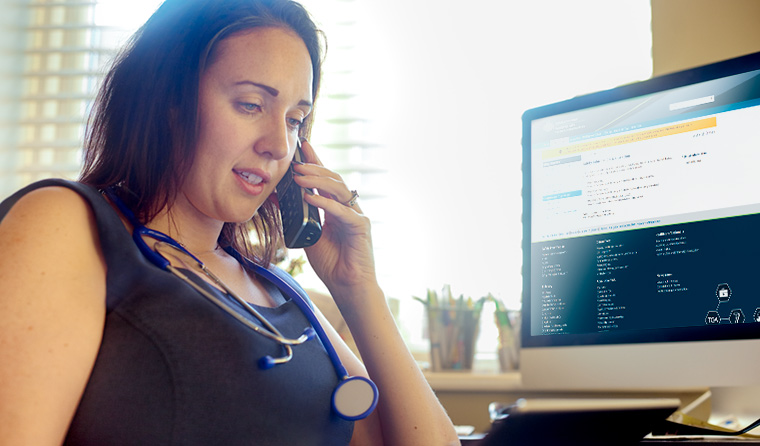News
RACGP cautions against use of ‘pop-up’ telehealth services
The college is reminding patients to continue the relationship with their regular GP instead of relying on corporate telehealth services.
 Dr Nespolon said fragmenting services and not providing continuous care is a ‘terrible outcome’ for public health.
Dr Nespolon said fragmenting services and not providing continuous care is a ‘terrible outcome’ for public health.
‘Ensuring continuity of care is vital in achieving the highest possible standard of primary care. If you can get to know your own GP that is ideal.
‘An ongoing GP–patient relationship is critical to delivering patient-centred, comprehensive and coordinated care.’
RACGP President Dr Harry Nespolon is discussing the importance of maintaining clinical relationships amid concerns of fragmentation of care from new corporate telehealth services.
The COVID-19 pandemic has seen the introduction of government-subsidised Medicare Benefits Schedule (MBS) items expanding patient access to telehealth and telephone services.
The college recognises the value in greater access to telehealth increasing accessibility and flexibility in delivery of care, particularly with current efforts to help limit the spread of coronavirus.
However, the RACGP position statement underlines the fact that, to ensure quality and continuity of care, it is important these services be provided by the patient’s usual GP or practice wherever possible, or that care is coordinated with the usual GP or practice.
The telehealth expansion has also seen a surge in models and businesses that typically rely on rapid patient turnover, leaving little time for discussions regarding preventive health, chronic conditions and long-term wellbeing.
The RACGP is urging Australians to avoid these new corporate ‘pop-up’ telehealth models and businesses in place of consultations with their regular GP.
‘Seeking care and having someone deal with your medical concern through a call centre means it’s highly unlikely you will ever get to speak to that person again,’ Dr Nespolon said.
‘Your usual GP will know your medical history and have a greater sense of your life situation. An ongoing relationship is particularly important for identifying and addressing mental health issues.’
Patients who have an ongoing relationship with their GP report higher levels of satisfaction and better health outcomes, particularly when it comes to avoiding emergency department presentations and hospitalisations.
Findings from the RACGP’s General Practice: Health of the Nation 2019 report confirm that 76% of people felt their GP always spent enough time with them, 81% showed respect, and 74% listened carefully, cementing the fact patients are more likely to receive ongoing continuity of care from their GP.

The RACGP recognises the value in access to telehealth increasing accessibility and flexibility in delivery of care, particularly with current efforts to help limit the spread of coronavirus.
According to Dr Nespolon, if a patient is provided care outside of their usual general practice by a doctor who has no prior knowledge of their medical history, that continuity of care is compromised – resulting in ‘a massive problem’.
‘Fragmenting services and providing episodic, rather than continuous, care is a terrible outcome for public health,’ he said.
‘If we have a situation where patients are being paired to an unknown person, who possibly lives in a different town or city with little or no knowledge of local health services, then that is obviously not a good outcome.’
So-called corporate ‘pop-up’ telehealth models have also come under recent scrutiny by a chief public health funding advisor, who likened his experience with a ‘chatbot’ for a medical consultation to ‘no different than using a vending machine’.
He claimed the consultation lasted for just four minutes and 48 seconds and was conducted entirely via instant messages, ending with a script being emailed to him and a $73.95 fee for the level C MBS telehealth item. It involved no communication with the doctor via phone or video.
‘So disappointed with how some companies are misusing the new Medicare telehealth items,’ he said on social media.
Dr Nespolon agrees that some of the new telehealth services are potentially providing sub-standard and inappropriate care.
‘They are taking advantage of understandable anxieties in the community about contracting COVID-19 and expanding their operations,’ he said.
‘This poses considerable risks to the health and wellbeing of the community and the viability and reputation of high-quality brick-and-mortar general practices.’
The RACGP launched its Expert Advice Matters campaign in April, encouraging all Australians to visit their GP to ensure optimal health. Dr Nespolon has been diligently putting out the message for all patients to take care of their wellbeing and consult with their regular GP for any health concerns.
‘Get to know your GP, we are there to help you every day for any health concern you may have,’ he said.
‘We are also there to support you in your longer term health needs, broader wellbeing and self-management.’
Log in below to join the conversation.
continuity of care telehealth
newsGP weekly poll
Health practitioners found guilty of sexual misconduct will soon have the finding permanently recorded on their public register record. Do you support this change?